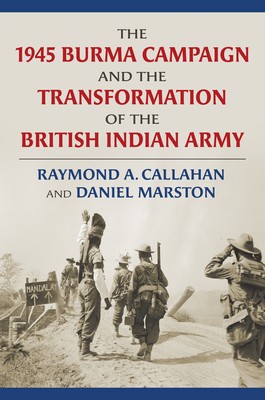
- We will send in 10–14 business days.
- Author: Raymond Callahan
- Publisher: University Press Of Kansas
- ISBN-10: 0700630414
- ISBN-13: 9780700630417
- Format: 16.3 x 23.4 x 2.8 cm, hardcover
- Language: English
- SAVE -10% with code: EXTRA
The 1945 Burma Campaign and the Transformation of the British Indian Army (e-book) (used book) | bookbook.eu
Reviews
Description
In 1945, the Indian British XIV Army inflicted on the Imperial Japanese Army in Burma the worst defeat in its history. That campaign, the most brilliant and original operational maneuver conducted by any British general in the twentieth century, largely forgotten until now, is a full and fresh account utilizing a full range of materials, from personal accounts to archival holdings--including the bits the official historians left out, such as the attempt by a jealous British Guards officer to have Slim sacked at the conclusion of the campaign.
After the retreat from Burma in 1942, Lieutenant General Sir William Slim, commander of the British XIV Army, played a crucial role in the remarkable military renaissance that transformed the Indian Army and then, with that reborn army, won two defensive battles in 1944, and in the 1945 campaign shredded his Japanese opponents. Behind this dramatic story was another: the war marked the effective end of the Raj. This great transformation was, of course, brought about by many factors but not the least of them was the "Indianization" of the Indian Army's officer corps under the pressure of war. As Slim's great victory signposted the change from the army Kipling knew to a modern army with a growing number of Indian officers, the praetorian guard of the Raj evaporated. "Every Indian officer worth his salt is a nationalist," the Indian Army's commander-in-chief, Claude Auchinleck, said as the XIV Army took Rangoon. The Burma campaign may not have contributed in a major fashion to the final defeat of Japan, but it was of first-rate importance in the transformation of South Asia, as well as underlining the continuing importance of inspired leadership in complex human endeavors.EXTRA 10 % discount with code: EXTRA
The promotion ends in 15d.07:37:20
The discount code is valid when purchasing from 10 €. Discounts do not stack.
- Author: Raymond Callahan
- Publisher: University Press Of Kansas
- ISBN-10: 0700630414
- ISBN-13: 9780700630417
- Format: 16.3 x 23.4 x 2.8 cm, hardcover
- Language: English English
In 1945, the Indian British XIV Army inflicted on the Imperial Japanese Army in Burma the worst defeat in its history. That campaign, the most brilliant and original operational maneuver conducted by any British general in the twentieth century, largely forgotten until now, is a full and fresh account utilizing a full range of materials, from personal accounts to archival holdings--including the bits the official historians left out, such as the attempt by a jealous British Guards officer to have Slim sacked at the conclusion of the campaign.
After the retreat from Burma in 1942, Lieutenant General Sir William Slim, commander of the British XIV Army, played a crucial role in the remarkable military renaissance that transformed the Indian Army and then, with that reborn army, won two defensive battles in 1944, and in the 1945 campaign shredded his Japanese opponents. Behind this dramatic story was another: the war marked the effective end of the Raj. This great transformation was, of course, brought about by many factors but not the least of them was the "Indianization" of the Indian Army's officer corps under the pressure of war. As Slim's great victory signposted the change from the army Kipling knew to a modern army with a growing number of Indian officers, the praetorian guard of the Raj evaporated. "Every Indian officer worth his salt is a nationalist," the Indian Army's commander-in-chief, Claude Auchinleck, said as the XIV Army took Rangoon. The Burma campaign may not have contributed in a major fashion to the final defeat of Japan, but it was of first-rate importance in the transformation of South Asia, as well as underlining the continuing importance of inspired leadership in complex human endeavors.

Reviews